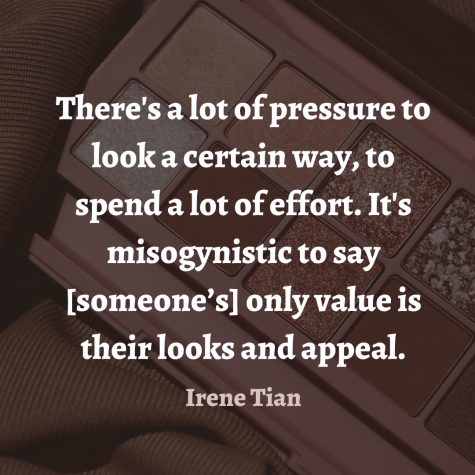Makeup, to others, is an unwanted mask.
November 17, 2022
Junior Irene Tian attributes her resentment towards makeup as something learned, as she had no choice over wearing makeup because of her participation in dance competitions growing up. To Tian, sitting in a chair and waiting for her mother to finish her makeup was painstakingly tedious. Eventually, her impatience with makeup led to her quitting competitive dance.
Tian’s biggest reason for her refusal to wear makeup is her dislike for being stereotyped as girly. In elementary school, she found pride in being called a tomboy.
“When I was younger, I just followed whatever my brother did,” Tian said. “So I liked typical stuff assigned to boys, like cars and running.”
So, Tian continued to reject anything dubbed feminine. She also adds that makeup can have a harmful effect, as it can cause one to overly reflect on the difference between how people perceive themselves to look versus how they would like to look.

“It can definitely have a negative impact when you feel like you have to look a certain way to be accepted,” Tian said. “There’s a lot of pressure to look a certain way, to spend a lot of effort. It’s misogynistic to say [someone’s] only value is their looks and appeal.”
Senior Arnav Kumar extends Tian’s point, stating that the makeup industry is harmful because it targets the insecurities that women, specifically young girls, have.
“The makeup industry has been [problematic] the way that they get young girls to be insecure,” Kumar said. “[In] India, you [have] Fair and Lovely that’s trying to make you feel bad about your skin color [by] trying to make you want to lighten your skin. They try to push [this idea] on young girls, especially nowadays, [with] 11- and 12- year-olds doing makeup — like full faces — which I think is too young.”
Tian agrees with Kumar and says makeup can influence people into conforming to convention and looking a certain way.
“I saw it as a way for girls and women to be more trapped [since they] put on this facade,” Tian said. “It felt like [women] were being forced to spend a lot of time and effort caring about how they looked and not about other things that I thought were more fun. I didn’t really care about my looks. I thought it was unimportant. It was very shallow — that was my opinion of it when I was younger.”



























